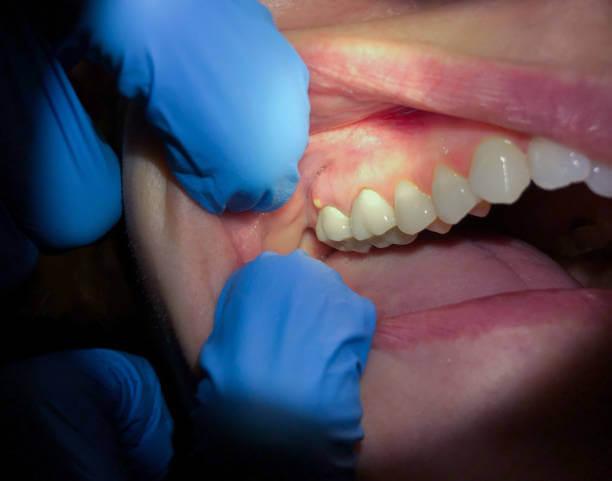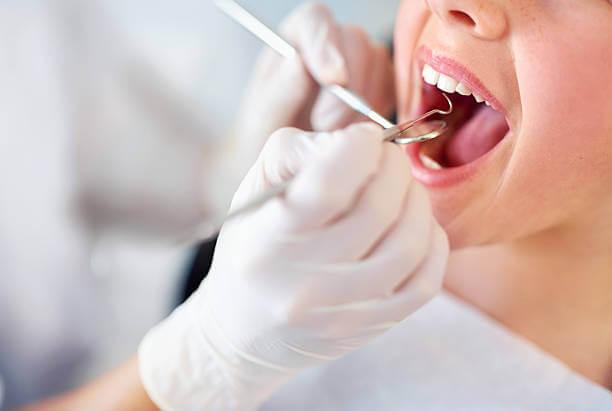March 30, 2025

When it comes to dental health, few things are as painful—or as concerning—as a dental abscess. This pocket of pus caused by an infection can lead to serious discomfort, swelling, and, if left untreated, even more severe complications.
Understanding how to manage a dental abscess at home is crucial, but it’s equally important to know when it’s time to seek professional help. At River’s Edge Dental, we understand the urgency and discomfort that come with dental abscesses.
That’s why an assessment followed by cleanings is essential to identify potential issues early and maintain optimal oral health. Let’s dive into what you can do to manage a dental abscess at home and when you should reach out to a professional.
A dental abscess is essentially an infection that leads to a buildup of pus within the tooth or the surrounding gums. But why does this happen?
Well, it’s usually due to a bacterial infection that has accumulated in the soft pulp of the tooth. This can result from an untreated cavity, gum disease, or even a cracked tooth.
There are two main types of dental abscesses: periapical and periodontal. A periapical abscess occurs at the tip of the tooth’s root, while a periodontal abscess occurs in the gums next to the tooth root. Both are incredibly painful and require prompt attention.
At River’s Edge Dental, we’ve seen and treated it all—ensuring our patients get relief and prevent future issues.
How do you know if you’re dealing with a dental abscess? Here are some telltale signs:
Catching a dental abscess early can make all the difference. Early intervention can prevent the infection from spreading, reducing the need for more invasive treatments.
Addressing symptoms promptly—like taking care of swelling and pain—can help you manage the situation until you can see a dentist. But remember, self-care is not a substitute for professional treatment; it’s a way to keep things under control until you get the help you need.
If you’ve noticed swelling around the affected tooth, there are a few things you can do right away to help manage it.
Rinsing your mouth can help keep the area clean and reduce the risk of spreading the infection.
What you eat can impact your recovery, so it’s important to be mindful of your diet when dealing with a dental abscess.
You might be tempted to skip brushing or flossing because of the pain, but maintaining good oral hygiene is essential.
When you’re dealing with the pain of a dental abscess, finding relief is a top priority. If your current pain management strategies aren’t cutting it, it might be time to reassess.
If your pain persists or worsens despite trying various remedies, it’s a sign that something more serious might be going on. Difficulty sleeping, eating, or concentrating due to pain are red flags that indicate it’s time to seek professional help.

So, when should you stop trying to manage things on your own and call in the professionals? Here are a few signs that it’s time to make that call:
Sometimes, a dental abscess can become a serious medical emergency. If you notice spreading redness, a high fever, or swelling that makes it hard to breathe or swallow, seek emergency care right away.
These could be signs that the infection is spreading to other parts of your body. Left untreated, a dental abscess can lead to systemic infections, including sepsis, which is a life-threatening condition. This is why it’s so important to know when to seek help.
At River’s Edge Dental, we’re equipped to handle even the most severe cases with advanced procedures and a team that’s committed to your well-being.
When it comes to treating a dental abscess, River’s Edge Dental is your go-to solution in Mooresville, NC.
We use state-of-the-art technology to diagnose and treat abscesses effectively. From digital X-rays to precise drainage procedures, our team ensures that you receive comprehensive care.
Whether it’s a simple incision and drainage or a more complex root canal, our experienced team is here to help you recover quickly and comfortably.
Choosing the right dental care provider can make all the difference in your experience.
At River’s Edge Dental, our team combines years of experience with a genuine commitment to your comfort and satisfaction. We listen, we care, and we tailor our services to meet your unique needs.
Our modern facilities are designed with your comfort in mind, and our personalized approach ensures that you feel informed and at ease throughout your treatment.
Dental abscesses are no joke—they’re painful, potentially dangerous, and demand immediate attention. While dental abscess self-care at home can provide temporary relief, it’s crucial to understand when you need to see a professional.
Your dental health is too important to ignore. If you’re dealing with a dental abscess, River’s Edge Dental is here to help. Call us now to book your consultation and get back to living pain-free.
Please schedule your next appointment by calling us at (123) 456-7890
BOOK APPOINTMENT